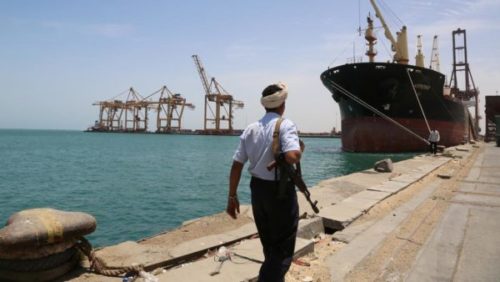
Yemen’s Foreign Minister, Khalid al Yamani, said on Monday that the Saudi-backed government is willing to accept a U.N. role in Hodeidah’s seaport, but not a long-term presence in the city itself.
Hodeidah’s seaport is the entry point for most of the country’s commercial goods and aid supplies.
Mediator Martin Griffiths, who opened United Nations-sponsored peace talks between Yemen’s warring parties in Sweden last week, wants to avert a full-scale assault on the Red Sea city.
Yamani told Reuters that Hodeidah, which is currently held by the Iranian-aligned Houthi group, should come under the control of his government.
The Houthis control most population centres, including the capital, Sanaa, which it seized in 2014 after ousting the internationally-recognized government of Abd-Rabbu Mansour Hadi that is backed by a Saudi-led coalition.
Control of Hodeidah, the Houthis’ main supply line, is one of the trickiest issues at the talks in Sweden, aimed at paving the way for a political process to end nearly four years of war.
The Houthis told Reuters they want Hodeidah to be declared a neutral zone.
Yamani rejected this idea. “The concept of peacekeeping or some sort of permanent presence of the U.N. — boots on the ground — or making the city as neutral is something that we will never accept,” he said on the sidelines of the talks.
Yamani, who heads the Hadi government delegation, said the city should be placed under the control of the interior ministry’s police forces as a matter of sovereignty.
However, the government is willing to accept the deployment of monitors from the U.N. Verification and Inspection Mechanism (UNVIM) in the port.
It could also accept the transfer of port revenues to the central bank in Hodeidah instead of routing them to Aden, the Hadi government’s temporary base, the minister said.
The U.N. is seeking agreement on a ceasefire in Hodeidah as well as other confidence-building measures such as re-opening Sanaa airport during the talks, which have already announced agreement on a prisoner swap.
Prospects for the peace talks have risen as Western nations, some of which supply arms and intelligence to the Sunni Muslim coalition, press for an end to the war that has killed tens of thousands of people and left more than 8 million facing famine.
The conflict, seen widely in the region as a proxy war between Riyadh and Tehran, has come under increased scrutiny after the Oct. 2 murder of Saudi journalist Jamal Khashoggi at the kingdom’s Istanbul consulate that drew global condemnation.
The alliance intervened in the civil war in 2015 to restore Hadi’s government but has faced military stalemate since seizing the southern port city of Aden the same year.